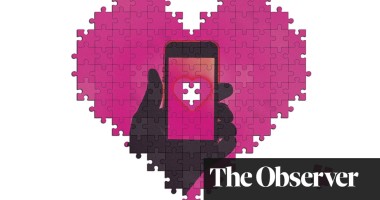‘The science isn’t there’: do dating apps really help us find our soulmate?
A class-action lawsuit filed in a US federal court last Valentine’s Day accuses Match Group – the owners of Tinder, Hinge and OkCupid dating apps, among others – of using a “predatory business model” and of doing everything in its power to keep users hooked, in flagrant opposition to Hinge’s claim that it is “designed to be deleted”.
The lawsuit crystallised an ocean of dissatisfaction with the apps, and stimulated a new round of debate over their potential to harm mental health, but for scientists who study romantic relationships it sidestepped the central issue: do they work? Does using the apps increase your chances of finding your soulmate, or not? The answer is, nobody knows.
“The science isn’t there,” says sociologist Elizabeth Bruch of the University of Michigan, who has studied online dating for a decade.
…
Of course, offline methods can be frustrating too, but what if they could all be improved?
The technology that enables online dating presents a golden opportunity for collecting the data that, until now, has been so hard to come by, and for developing the missing science of human connection. And since the companies are so secretive, and commercially oriented, a number of academic research groups have begun building their own apps – ones that will double as matchmaker and research tool.
Bruch and University of Michigan psychologist Amie Gordon will roll out their free app this summer, to the local student population to begin with, and they hope to have preliminary findings by December. Bruch says that unlike the commercial alternatives, theirs will be launched with full disclosure: “We don’t know who you’re compatible with.”
…
Ethicist Luke Brunning of Leeds University, who with fellow ethicist Natasha McKeever is also building a research-oriented dating app, says that one of the problems with the commercial products is that they allow users to filter their searches according to their own preconceptions of compatibility, which might not be justified. “Relating to other people is a complicated thing that takes work and effort,” he says. “It unfolds in unpredictable ways that often surprise us when we look back on it.”
Bruch and Gordon are getting around this with a trade-off: in return for seeing the profiles they choose most of the time, users must agree to participate in “Serendipity Sundays” where they have less control over who is presented to them. “The goal is to be as transparent as we can,” says Gordon. “We’re telling people: experiment with us.”
…
One key question will be what exactly people are using the apps for, since it’s clear their goal isn’t always to secure a date. Some might be passing time with a flirtation, for example, while others might be looking to make connections in a new city. Ultimately the researchers hope the companies will use their findings to hone apps that work better for all users.
Sceptics may feel that’s unlikely, since the companies’ drive to maximise profits is incompatible with many users’ wish to find love and delete the app. The ongoing US lawsuit accuses Match Group of deploying “addictive, game-like design features, which lock users into a perpetual pay-to-play loop”.
There is some evidence that people can become addicted to dating apps, and although more research is needed, anthropologist Natasha Schüll of New York University thinks there’s merit in the lawsuit’s claim. She spent 15 years observing slot machine players in Las Vegas, reporting her findings in the highly acclaimed book Addiction By Design (2012), and she sees clear parallels between dating apps and slot machines. They hook people with the promise of love rather than riches, she says, but they hold them in the same way – through the game-like design of their interfaces, which engage the brain’s reward circuits.
Some habitual players of slot machines report entering a trance-like state as they repetitively spin the wheels. “Gamblers talk about this as the thing that they become addicted to – to the point where winning a jackpot irritates them because it stops the flow of the game,” says Schüll. “I have heard people say this about dating apps.”
But dating apps, she says, are far from alone in exploiting the hook-and-hold mechanism of slot machines. “To my mind, the bigger criticism here is of the contemporary model of capitalism – the click economy,” she says.





Add comment